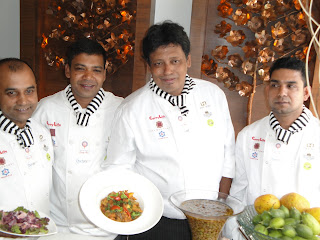In a Kolkata steaming in the hottest pre-monsoon April for 52 years, as a volcano wreaked havoc in the skies over faraway Britain, the Taste of Britain Food Festival was launched at the 5-star Hotel Hindustan International. In true coals to Newcastle fashion, the event aimed to introduce the public of Kolkata to the famous institution of British curry, highlighting one of the greatest culinary success stories of our age.
It was no accident that Kolkata was chosen as the venue for a festival that featured British/Bangladeshi chefs. The economic centre of West Bengal, it was the former capital of the British Raj, it’s the place where the British received their penchant for Indian food; in short it’s where curry was born.
As local and national media assembled for the press launch of the 10-day Taste of Britain Festival, there was a palpable buzz of excitement in the air. The focus of attention was our four master chefs from Britain and Bangladesh selected from across the UK to present their successful signature dishes for the delight of city gourmets.
We’d been told that Kolkatans, renowned for their love of food and dining, were a bit sceptical as to what Bangladeshis from the culinary wastelands of Britain could possibly teach Indians about their own cuisine? And not only food – we’d even brought our own version of an Indian beverage; Bangla Premium Beer, brewed to an old Bengali recipe - in Manchester, UK.
Production teams, journalists and food critics lined up for interviews as the imposing figure of the Partha Mittra, executive chef of the Bengal Dynasty in Chester, took centre stage to explain that British curries tend to use less ghee, colour and salt than Bengali recipes. Softer on the palate and milder, they are more flavoursome and healthy with the quality of ingredients being of paramount importance, he told journalists.
Meanwhile, top UK chefs; Abul Monsur of Taj Cuisine in Chatham, Ataur Rahman Harun of the Taj Mahal in Stevenage and Pintu Rosario, of the Dhaka Sheraton presented their individually created signature dishes of rosemary infused Chicken Dumplings, a quintessentially English Roast Lamb Jardaloo, Broccoli and Rosemary Meat Ball Curry and Balti Fish Exotica dishes to an eager posse of reporters.
Over the next ten days, excitement generated by the launch of the festival showed no signs of dying down as restaurant bookings went up and up. Festival organisers Syed Belal Ahmed and Syed Nahas Pasha continued to be feted by national and international dailies. As word of the skills of the British/Bangladeshi- based Indian chefs spread, guests included restaurateurs from all over the city; even the Bangladesh High Commissioner to the UK dropped in to find out what the fuss was about. Festival goers were intrigued and enthusiastic but a little bit confused. Their main curiosity was about the Balti dishes said to have originated in Birmingham. People were divided as to whether British curries would catch on in India. Some wondered if they might find anglicised curries a bit on the bland side; Bengali cuisine is famous for its dhal based recipes. It favours sour tasting tamarind or yoghurt flavoured dishes, strong fish steamed with oil and spices, aubergines, ubiquitous mango dishes and paneer.
We’re pleased to report that the vast majority were enthusiastic converts. The festival was pronounced a huge success; sales were up 18%; customer feedback was excellent and people were surprised by the mildness and the flavour of the food. British curries were described as being more healthful, lighter and better presented. Utpal Mondal, executive chef at HHI, expressed a desire to include some of the Balti dishes on the menu in the future (with the addition of a little more spice) and dismay at the team’s imminent departure. It would seem that British curry and the chefs had won the day. As the volcanic dust cleared across the world, the monsoon kicked in to herald our departure.






With its genuine taste, welcoming atmosphere, and helpful personnel, Jeera really stands out. The ideal spot for local Indian foodies!
ReplyDeletetop 10 indian restaurant near me